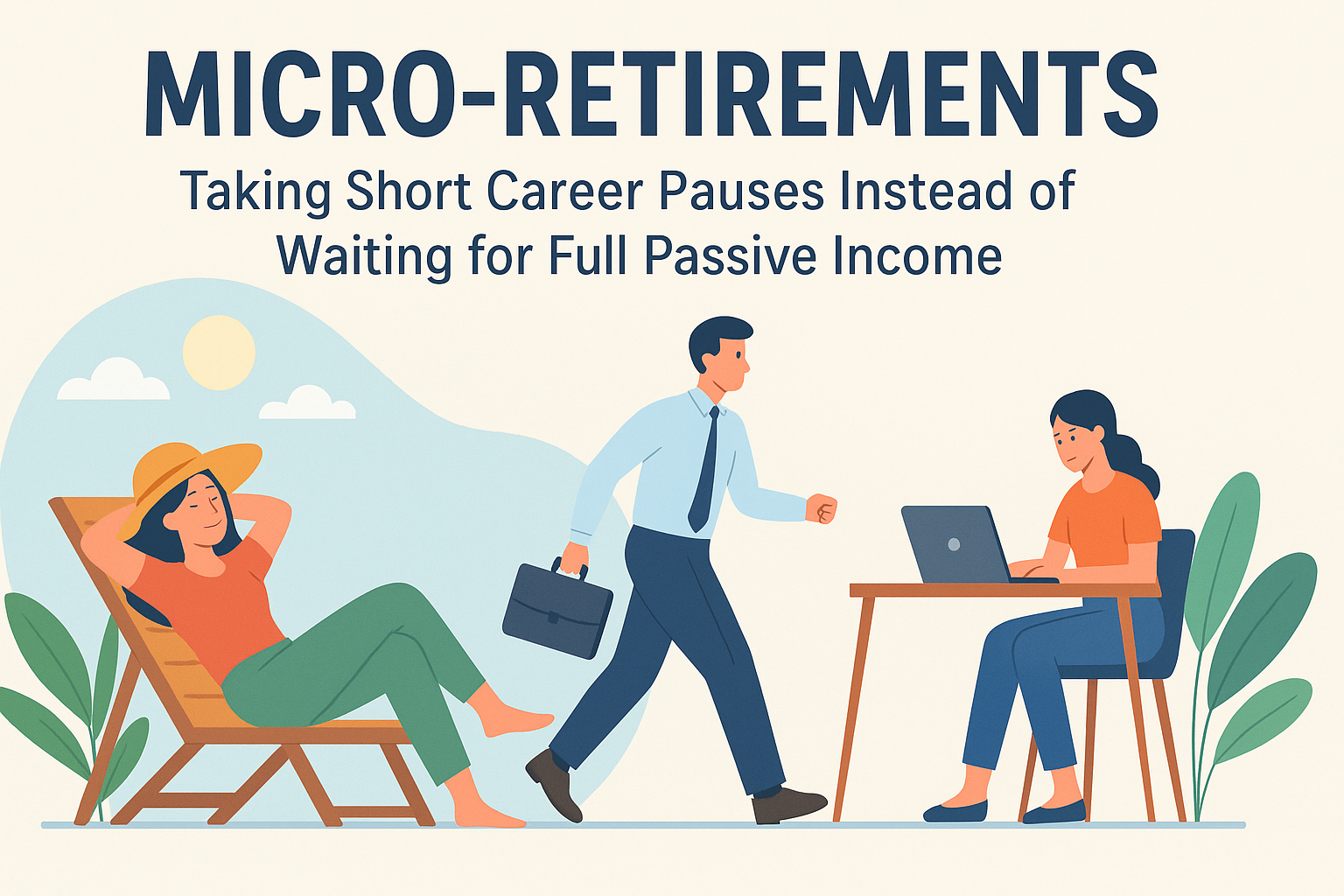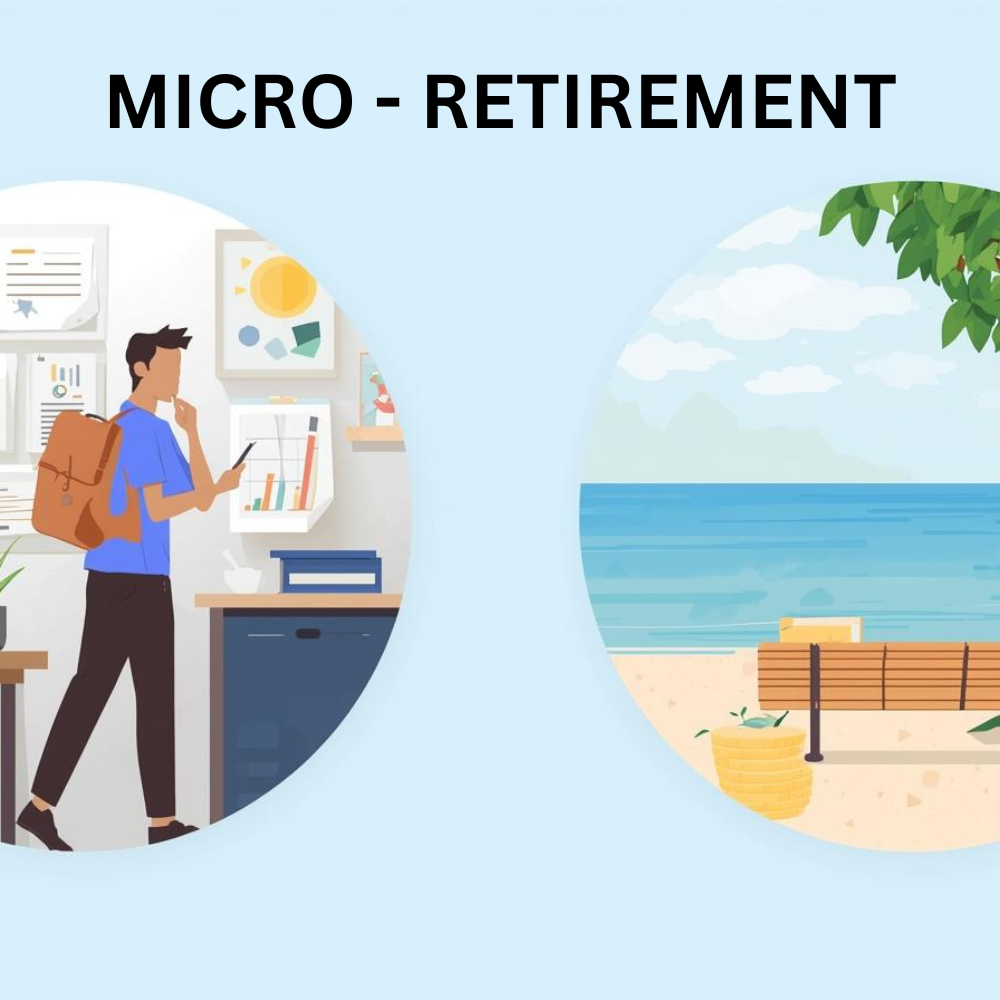Micro-Retirements: Taking Short Career Pauses Instead of Waiting for Full Passive Income
Introduction
Many of us have been told to give it your fifty years of work and retire later but what if "later" never comes? Micro-retirements turn this idea on its head and challenge us to take short meaningful breaks over the course of our careers rather than wait for one large retirement at the end. These breaks are not about abandoning ambition, but they do allow you to refuel your ambition. It might be about planning a different kind of vacation, learning something new, or even simply resting without guilt, micro-retirements are intended for people to live intentionally while in the middle of life, not just at the end.

Reimagining Retirement in Today’s World
The old concept of retirement – work non stop until you are in your 60s and enjoy life – no longer fits our world. The current generation values freedom, balance, and experiences over waiting for ‘someday’ to arrive. Micro-retirements give us a new perspective. Rather than one lengthy retirement at the end of life, we plan mini-retirement experiences throughout life. This presents lifestyle changes in that it allows us to seek joy in our lives while continuing to work towards our long-term plans. Rather than a full departure from a job or career, it is an intentional pause, recalibration, and return with refreshed energy. There is a time to step away from responsibilities and a time to give ourselves unstructured time to travel, pursue hobbies, or simply to do nothing, but importantly to living life aware of each phase as a chapter of life and joy followed by work. In this new version of retirement, we don’t wait to start living our lives, we create our lives by pausing and breathing through the hustle.
Recharging Emotionally and Creatively by Pausing Work
Taking time away from work isn’t laziness — it’s one of the most restorative ways to reset your mind. Micro-retirements provide you with the space to step back from the ever-present urgency of deadlines and reconnect with what matters most. During these breaks, you have time to re-engage with who you are, who your loved ones are, and with life outside of work. Many people report that creativity flows more easily when they are not under pressure. You may return invigorated with a new idea, with a more refined vision, or merely with more energy to face and resolve the challenges you face at work and life. Whether that break is employing a hobby (like hiking, painting, learning, or simply sleeping in), what it all boils down to is recharging your emotional battery for mental restoration. Breaks can help recover our minds before burnout is present and often lead to unexpected breakthroughs. Remember…a rested mind is a creative mind. Micro-retirements remind us that productive and peaceful (cruise control) states are possible if we stop to rest and recharge.

Financial Preparation for Micro-Retirements
One of the most common misconceptions about taking some time off is that you must have money. The reality is anyone can create short and inexpensive breaks with good planning. Financial preparedness for micro-retirements is about flexibility, not about having millions in savings. Regularly setting aside money, trimming the monthly budget and being frugal in your approach are all ways to make micro-retirement a reality. Some people also create income streams that can be passive or done remotely (like freelancing or online work) to sustain some income during their breaks from work. Planning in advance – budgeting, researching affordable options, and changing your lifestyle – makes this concept less scary. Micro-retirements shouldn’t be considered a luxury but an investment in health and well-being. You’re not saving every rupee for an uncertain future, you’re using some of your savings to enjoy the present – impacting your financial future in a very small way. It is a purposeful means of integrating rest into your life plan.
Establishing a Career that Supports Flexibility
In order to pursue micro-retirements, your career must support flexibility. This does not mean quitting your job, but rather creating your career where both flexibility and autonomy are valued in your professional life. More and more people today are turning to freelance work, remote work, or project-based jobs that allow them to take micro-retirements. Others go the route of negotiating sabbaticals, or looking for a company that prioritizes mental well-being and work-life balance. When you have diverse skills, it affords you the freedom to step away from or pause work without the risk of losing your momentum. You want to create a career that works with your life, not one that dictates it. With the ability to work in locations across the globe, it’s easier than ever to create a career that flows with your personal rhythm. Micro-retirements benefit from this flexibility; they allow you to step back from, recharge, and return to the job with new ideas and energy. The point of the micro-retirement is not to ‘escape’ and work, but rather, create a life where there is an equilibrium between work and rest.
Conclusion
Micro-retirement encourages us to learn that life does not have to be lived in a linear path of infinite work, followed by rest. Intentional short breaks help us remain engaged, creative, and fulfilled throughout the journey. This is not about escaping responsibility, but rather creating space to breathe and fully live. When we can be intentional with pauses, we find balance is not something you look to achieve at the end, but rather something you create along the way.
